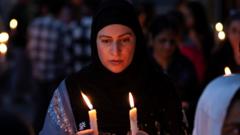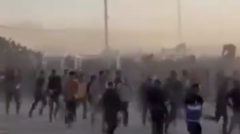In the aftermath of a brutal attack in Pahalgam that claimed 26 lives, the Kashmiri community is facing mounting fears and prejudice as they confront acts of violence and public vilification in Indian cities. The sentiments of cultural identity and safety loom heavily over their lives, even as protests for peace emerge from within the region.
Kashmiris Face Rising Violence and Fear After Recent Attack

Kashmiris Face Rising Violence and Fear After Recent Attack
Kashmiris in India are experiencing increased violence and harassment following a deadly attack in their homeland, prompting many to reconsider their safety in the mainland.
Shabir Ahmad Dar, a longtime pashmina shawl seller in Mussoorie, Uttarakhand, finds himself grappling with a harrowing reality. After decades of plying his trade in the scenic hill town, his identity as a Kashmiri has transformed from a cherished link to home into a painful mark of suspicion. Following an attack that killed 26 people in Kashmir, Dar was assaulted by a right-wing group who unjustly blamed him for the violence due to his background.
Spooked by the assault, Dar and other Kashmiri vendors have since left the area, opting for safety despite the significant loss of goods. "We are too scared to go back," Dar admits, revealing that the attackers ransacked their stall and left them shaken. Their plight is echoed throughout the region, as reports of harassment against Kashmiri individuals proliferate, with alarming incidences occurring both in public spaces and academic institutions.
In the climate of heightened tension, the Indian government has responded with intensified security measures in Kashmir, detaining thousands and demolishing homes of alleged militants. Civilian sentiment, however, is brewing against the harsh repercussions faced by the community, described as “collective punishment,” while leaders like Chief Minister Omar Abdullah caution against innocent civilians suffering due to government actions.
Public opinion is keenly divided; while many express outrage at the attack and demand accountability, the repercussions felt by Kashmiris are often dire. Women, like Ummat Shabir, share harrowing stories of being ostracized and targeted based solely on their Kashmiri heritage. "We had to travel back to Kashmir without any option," she reminisces the challenges faced in returning to her hometown where she believed safety would reign.
Despite the government touting improvements in stability and the economy since 2019, skepticism lingers. Critics argue that the obfuscation of civil liberties in the face of security measures creates a volatile atmosphere for Kasmiri locals. The continuing struggle against a backdrop of turmoil has ignited fear among individuals trying to live normal lives amidst uncertainty.
As protests ripple through Kashmir following the recent attack, the weight of identity, vulnerability, and the struggle for peace continues. Figures like novelist Mirza Waheed highlight the despair and humiliation faced by Kashmiris who endure relentless alienation and prejudice within their homeland, caught in an unending limbo of strife.
For many, like Mohammad Shafi Dar, a daily wage worker, the situation has escalated into tragedy. After security forces razed his home in response to his son’s alleged associations, he and his family now face the dire consequences of displacement and despair. "We lost everything," he laments, as life continues under the open sky, highlighting the profound challenges endured by families grappling with fear and loss.
Spooked by the assault, Dar and other Kashmiri vendors have since left the area, opting for safety despite the significant loss of goods. "We are too scared to go back," Dar admits, revealing that the attackers ransacked their stall and left them shaken. Their plight is echoed throughout the region, as reports of harassment against Kashmiri individuals proliferate, with alarming incidences occurring both in public spaces and academic institutions.
In the climate of heightened tension, the Indian government has responded with intensified security measures in Kashmir, detaining thousands and demolishing homes of alleged militants. Civilian sentiment, however, is brewing against the harsh repercussions faced by the community, described as “collective punishment,” while leaders like Chief Minister Omar Abdullah caution against innocent civilians suffering due to government actions.
Public opinion is keenly divided; while many express outrage at the attack and demand accountability, the repercussions felt by Kashmiris are often dire. Women, like Ummat Shabir, share harrowing stories of being ostracized and targeted based solely on their Kashmiri heritage. "We had to travel back to Kashmir without any option," she reminisces the challenges faced in returning to her hometown where she believed safety would reign.
Despite the government touting improvements in stability and the economy since 2019, skepticism lingers. Critics argue that the obfuscation of civil liberties in the face of security measures creates a volatile atmosphere for Kasmiri locals. The continuing struggle against a backdrop of turmoil has ignited fear among individuals trying to live normal lives amidst uncertainty.
As protests ripple through Kashmir following the recent attack, the weight of identity, vulnerability, and the struggle for peace continues. Figures like novelist Mirza Waheed highlight the despair and humiliation faced by Kashmiris who endure relentless alienation and prejudice within their homeland, caught in an unending limbo of strife.
For many, like Mohammad Shafi Dar, a daily wage worker, the situation has escalated into tragedy. After security forces razed his home in response to his son’s alleged associations, he and his family now face the dire consequences of displacement and despair. "We lost everything," he laments, as life continues under the open sky, highlighting the profound challenges endured by families grappling with fear and loss.






















